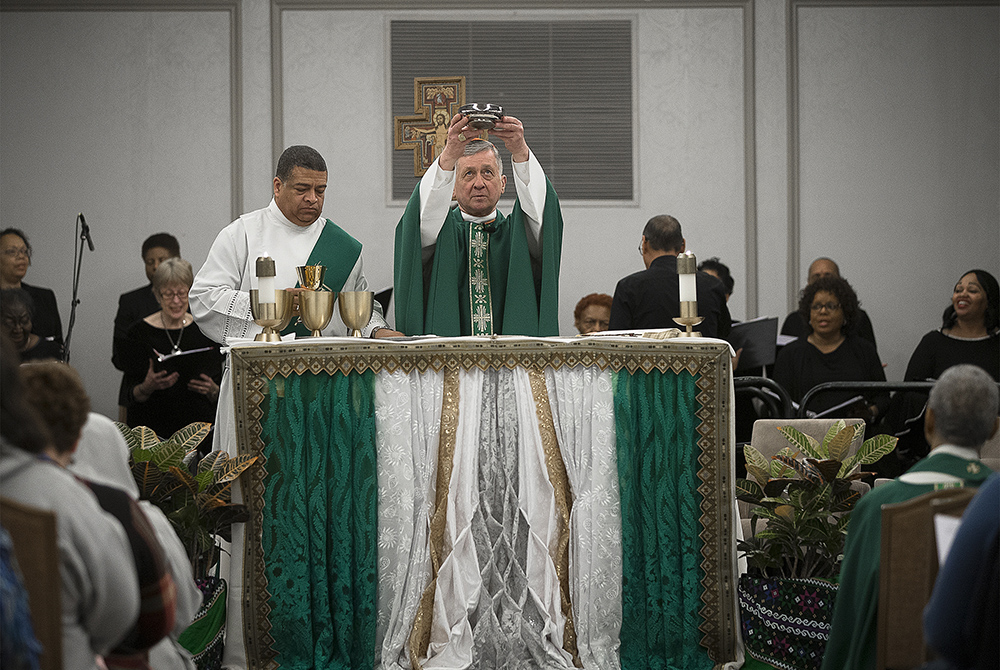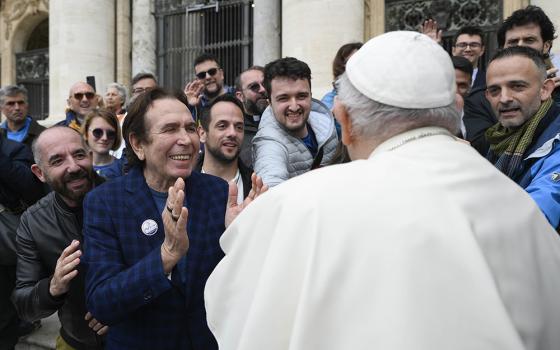
Cardinal Blase Cupich of Chicago celebrates the opening Mass Jan. 25, 2020, at the Catholic Social Ministry Gathering in Washington. (CNS/Tyler Orsburn)
Today is the feast of St. Charles Borromeo, and the anniversary of the coronation of Pope John XXIII. It was not a coincidence that John chose that day for his coronation: He had edited the acta, or accounts, of Borromeo's pastoral visits after the Council of Trent, the council that achieved the most significant reforms in the history of the church. When John called the Second Vatican Council, he knew exactly what he was doing. Let's hope both the saintly cardinal-archbishop and the saintly pope are watching over the synodal process!
At the Pray Tell blog, Cardinal Blase Cupich of Chicago discusses the Holy Father's motu proprio Traditionis Custodes, which revoked the special permission to celebrate the traditional Latin Mass that has been given by Pope Benedict XVI but which had strayed from Benedict's goal of uniting the church. The money graph:
To put that word "reform" in perspective, just recall some of the other reforms following the Second Vatican Council, which we have witnessed in our days. In 1983, Pope John Paul II reformed the Code of Canon Law of 1917, in order to insure that Church Law conformed to the teachings of the Second Vatican Council. Likewise, the saintly pope in 1993 reformed the Catechism of the Catholic Church, again for the purpose of bringing it up-to-date in view of the theological insights of the Council. The way we worship was also reformed in view of the new self-understanding of the Church found in the dogmatic constitution Lumen Gentium and the theological and liturgical developments expressed in the Constitution on the Liturgy, Sacrosanctum Concilium. With the reforms of the Code and the Catechism, the Church left behind their earlier forms. No one would think of arguing that the earlier forms of the Code or the Catechism could still be used, simply because the word reform means something. And, so it has to mean something with regard to the liturgical reform.
"Reform means something." Bingo.
In the 1970s, the mantra was "the political is personal." Now, for some sad souls, the appropriate mantra is actually a diagnosis: The political is bonkers. The Washington Post reports on a gathering of QAnon followers in Dallas on Nov. 2 at Dealey Plaza, the site where President John F. Kennedy had been shot. They were expecting the return of the late president's deceased son, John F. Kennedy Jr., whom they expected to become former President Donald Trump's vice president when Trump gets reinstated.
Advertisement
In the Los Angeles Times, Mark Barabak talks to Rep. Tony Cárdenas about the increasingly vital Latino vote and how Democrats need to do a better job reaching out to them. It will be interesting to unpack which precincts in northern Virginia with a heavily Latino population turned out and how they voted as the Democrats conduct their post-mortem.
In The New York Times, columnist Paul Krugman publicly dissects the ego of Elon Musk. One of the most brutal, because precise, takedowns I have read in a long time. And, his plea for the Democrats to tax these monstrously rich jerks is mighty persuasive.
At Working-Class Perspectives, the great online journal of the Kalmanovitz Initiative for Labor and the Working Poor at Georgetown, James Catano examines the TV series "Dirty Jobs" in which the host, Mike Rowe, takes a closer look at some of the mostly hidden jobs our society needs to keep going. Catano rightly notes that Rowe focuses mostly on the kind of dirty jobs men do, but there are plenty of other dirty jobs that women do: Sewers and hotel rooms both need to be cleaned. Catano looks at how the division parallels some of the debate about the twin infrastructure bills before Congress. It will take time to include more "human infrastructure" in the idea of infrastructure, but it starts when we all start writing about it.
At the ambitiously named website "All That's Interesting," Kaleena Fraga examines 35 maps that show historical developments that shaped the world. When I saw the headline, I was expecting historical maps, that is, the map made after Christopher Columbus' voyages or the map Napoleon had at hand as he planned the battle of Jena, that sort of thing, showing the influence of geography on history. Instead, these maps show settlements in Roman Britain, migration patterns worldwide and a very telling map that indicates the few places on our planet that were not invaded by the British! All worth a look for seeing the broad sweep of historical events.







